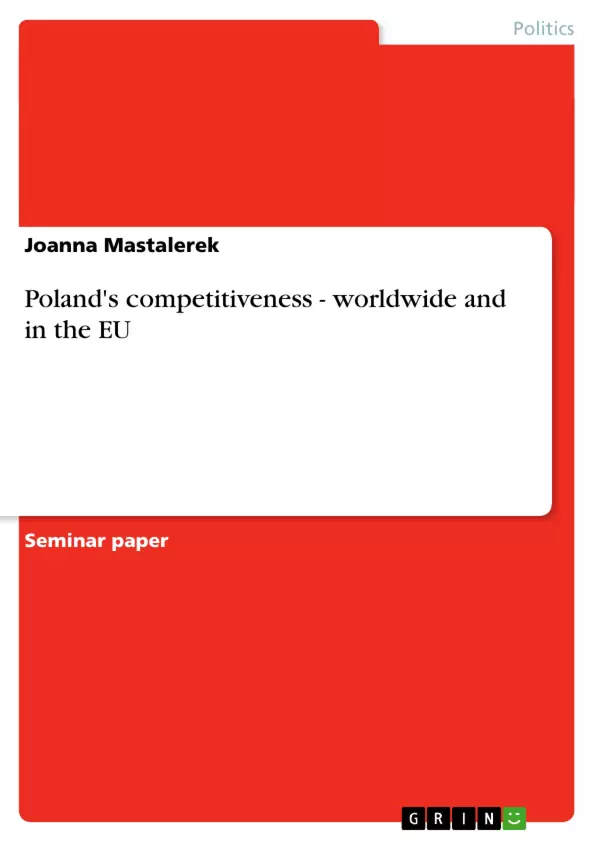Competitiveness is nowadays one of the central preoccupations of governments and industries wordwide. Especially for reintegrating Central and Eastern European Countries (CEECs) into the world economy these countries´ national competitiveness plays a crucial role. Even if national competitiveness has become a widespread concept, there still exists no final definition, as scientists point out. Though a first orientation about the concept of competitiveness can provide Michael E. Porter´s approach, in which he explains: “The only meaningful concept of competitiveness at the national level is national productivity. […] No nation can be competitive in everything. A nation´s pool of human and other resources is necessarily limited. The ideal is that these resources be deployed in the most productive uses possible.” Using Porter´s definition as a first anchor for the assessment of Poland´s competitiveness, one has to closer examine Poland´s level of national productivity.
Inhaltsverzeichnis (Table of Contents)
- The concept of national competitiveness by Porter
- Assessing Poland's competitiveness by means of Porter's "competitiveness" concept
- Assessing Poland's competitiveness by means of the Global Competitiveness Index 2003/04
- Assessing Poland's competitiveness by the 2002 Regular Report of the European Commission
- Poland's competitive weaknesses
- Poland's competitive strengths
- Future prospects of Poland's competitiveness: threats and opportunities
- References
Zielsetzung und Themenschwerpunkte (Objectives and Key Themes)
This text aims to evaluate Poland's competitiveness in a global and European context. It focuses on assessing Poland's competitiveness through the lens of Michael Porter's concept of national productivity and utilizes various indicators, including the Global Competitiveness Index and the EU Copenhagen Criteria.
- The importance of national competitiveness for reintegrating Central and Eastern European Countries (CEECs) into the world economy
- Assessment of Poland's economic performance and growth in relation to other CEECs
- Analysis of Poland's strengths and weaknesses in terms of both macroeconomic and microeconomic competitiveness
- Exploration of future prospects for Poland's competitiveness, including potential threats and opportunities
- Evaluation of Poland's progress toward meeting the EU Copenhagen Criteria for membership
Zusammenfassung der Kapitel (Chapter Summaries)
- Chapter 1: Introduces the concept of national competitiveness by Porter, emphasizing the importance of national productivity in achieving competitiveness. It defines competitiveness as national productivity and highlights the limitations of a nation's resources, emphasizing the need for efficient resource allocation.
- Chapter 2: Evaluates Poland's competitiveness using Porter's framework, highlighting its strong economic growth in the 1990s and analyzing GDP per capita growth. It introduces the Global Competitiveness Index (GCI) as a tool for further assessment.
- Chapter 2.1: Examines Poland's ranking in the GCI 2003/04, focusing on its growth and microeconomic competitiveness. It analyzes Poland's position relative to other CEECs and emphasizes the importance of both macroeconomic and microeconomic factors in competitiveness.
- Chapter 2.2: Explores the EU Copenhagen Criteria as another measure of competitiveness. It highlights the importance of a functioning market economy and the capacity to cope with competitive pressure within the EU. It references the European Commission's Regular Report 2002, which assesses Poland's progress toward fulfilling these criteria.
- Chapter 3: Focuses on Poland's microeconomic competitive weaknesses, analyzing the extent of privatization in the Polish economy and highlighting remaining challenges in key sectors such as coal, steel, energy, heavy chemicals, and defense.
Schlüsselwörter (Keywords)
This text focuses on the economic competitiveness of Poland, specifically within the context of its reintegration into world economic structures and its pursuit of EU membership. Key themes include national productivity, the Global Competitiveness Index, the EU Copenhagen Criteria, macroeconomic and microeconomic competitiveness, privatization, and structural reforms.
Frequently Asked Questions
How does Michael Porter define national competitiveness?
According to Porter, the only meaningful concept of competitiveness at a national level is national productivity. It's about how effectively a nation utilizes its limited resources.
What are Poland's main economic strengths?
Poland showed strong economic growth in the 1990s and has made significant progress in establishing a functioning market economy, which was a key requirement for its EU accession.
What are the weaknesses in Poland's microeconomic competitiveness?
Weaknesses include incomplete privatization in heavy industries like coal, steel, and energy, as well as the need for further structural reforms to cope with competitive pressure within the EU.
What are the EU Copenhagen Criteria?
These are the rules that define whether a country is eligible to join the European Union, including requirements for a stable democracy, the rule of law, and a competitive market economy.
What role does the Global Competitiveness Index (GCI) play in the analysis?
The GCI is used to rank Poland relative to other Central and Eastern European Countries (CEECs), analyzing both macroeconomic stability and the sophistication of company operations.
- Citar trabajo
- Joanna Mastalerek (Autor), 2004, Poland's competitiveness - worldwide and in the EU, Múnich, GRIN Verlag, https://www.grin.com/document/22202



